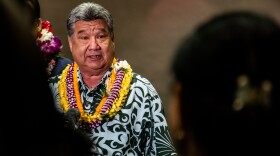State senators have proposed two measures to create utility assistance programs for low-income households: Senate Bill 191 and Senate Bill 994.
It would be a state-level equivalent to the federal Low Income Home Energy Assistance Program, or LIHEAP. LIHEAP, which offers one-time assistance with a utility bill, is the primary source of relief for Hawaiʻi households struggling with high energy costs.
But LIHEAP may only be meeting a fraction of the need in Hawaiʻi. It served just 2% of the state's population potentially eligible for energy assistance based on income in 2020, according to a report to the Legislature from the Public Utilities Commission.
Hawaiʻi saw a spike in utility disconnections in the wake of the pandemic, leading many to call for more assistance for households that fall behind on their electricity bills and are at risk of the utility cutting off their power.
Michael Angelo, head of the Division of Consumer Advocacy, said that while the measures proposed by state senators have a shared goal, there's an important difference in how they are funded.
SB191 would be funded through an existing surcharge that ratepayers currently pay. To make energy cheaper for low-income households, ratepayers at large may have their electricity bills raised or have fewer services.
That could worsen the very problem that the measure is trying to address, according to Angelo.
He prefers SB994, which would create a utility assistance program using $5 million of the state's general funds. Taxpayers would still be on the hook to fund the program, but Angelo said the approach is ultimately more equitable.
"Taxes are less regressive than utility rates. You pay proportional to your income, versus the same rate for everybody on an electricity bill," he said.
SB994 would also provide resources for families to make their homes more energy efficient, thus reducing their power bills. Angelo said the Division of Consumer Advocacy would like to see SB994 go through this session.
"Anything that we can do to help our most vulnerable customers pay their bills — attacking it from both angles so that they're getting that bill assistance to help decrease that cost burden and also getting access to energy efficiency programs — is extremely beneficial, from our view, to help people keep their lights on," he said.
But the clock is ticking on Angelo's favored measure. While SB191 has been passed out of committee, SB994 has just one day left to be scheduled for its first hearing.





